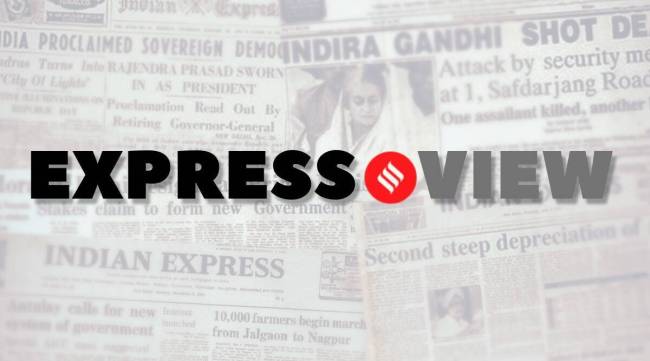Opinion Express View on Go First: Crash and burn
Go First filing for bankruptcy is likely to diminish competition in the aviation sector. This will have implications for consumers.
 As per reports, the airline owes Rs 6,521 crore to financial creditors, among them public sector banks, while its liabilities to all creditors have been pegged at Rs 11,463 crore.
As per reports, the airline owes Rs 6,521 crore to financial creditors, among them public sector banks, while its liabilities to all creditors have been pegged at Rs 11,463 crore. On Tuesday, Go First airline filed for insolvency amidst mounting cashflow woes following the grounding of almost half of its fleet. The airline has placed the blame for its situation on engine manufacturer Pratt and Whitney (P&W) for an “ever increasing number of failing engines”. Go First has accused P&W of not abiding by its contractual obligations as well as the arbitration order issued by the Singapore International Arbitration Centre. The order had directed P&W to “dispatch at least 10 serviceable spare leased engines by April 27, and 10 spare leased engines per month till December”. This, the airline believes, would have allowed it to resume full operations easing financial stress. However, Go First is not the only airline facing such problems. Reportedly, Hawaiian Airlines has also had to ground some of its aircraft powered by P&W.
As per reports, the airline owes Rs 6,521 crore to financial creditors, among them public sector banks, while its liabilities to all creditors have been pegged at Rs 11,463 crore. But the airline’s deteriorating financial situation should not come as a surprise. As it has itself stated,“the percentage of grounded aircraft due to Pratt & Whitney’s faulty engines has grown from 7 per cent in December 2019 to 31 per cent in December 2020 to 50 per cent in December 2022”. Over this period, the airline has seen its market share erode, falling from 11 per cent in November 2019 to 6.9 per cent in March 2023. More broadly, the airline’s problems point towards the perils of relying on a few international suppliers. Historically, countries with a strong defence manufacturing industry and tech capabilities have been more successful in this area. Considering the size of the Indian market, policy perhaps needs to take a more proactive role in facilitating greater manufacturing, maintenance and repair facilities in India.
Go First’s troubles will benefit other carriers as passenger growth picks up. Airline passenger traffic was already up 51.7 per cent during January-March 2023 over the same period last year. On Wednesday, shares of InterGlobe Aviation (IndiGo) were up 4.5 per cent, while SpiceJet was up 1.4 per cent anticipating the gains. SpiceJet has now announced plans to mobilise some of its grounded aircraft. However, it is possible that this development pushes the aviation sector in the country towards a duopolistic market structure. During January-March 2023, IndiGo’s market share stood at 55.7 per cent, while the next two biggest airlines Air India and Vistara (both owned by the Tata Group) accounted for 9 per cent and 8.8 per cent of the market. This diminishing competition will limit consumer choice and have implications for airline fares and consumer welfare.




